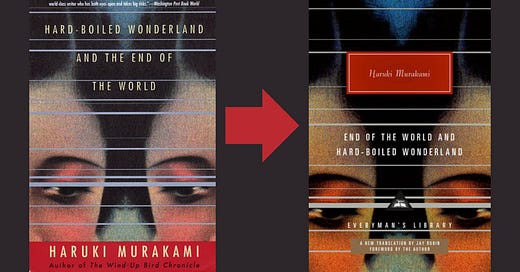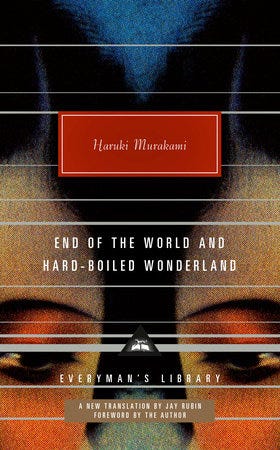New Translation of Murakami Novel Coming Soon
One of Haruki Murakami’s best novels has been retranslated… and renamed!
As though Murakami fans were not already excited enough about the impending release of his next novel (The City and its Uncertain Walls, coming in November), we also have a retranslation of a classic Murakami to look forward to.
Hard-Boiled Wonderland and the End of the World was first released in Japan in 1985 and was the author’s first book after his Trilogy of the Rat. Its English release came in 1991 after it was translated by Alfred Birnbaum. The book was also twice the length of Murakami’s previous novel, A Wild Sheep Chase, showing his growing confidence and developing narrative style.
Although Murakami’s name was becoming increasingly well known in the West at this point, Hard-Boiled Wonderland and the End of the World was a bit of a flop. It has since become a classic, but in 1991 Murakami was disappointed with sales and started taking more control of his foreign translations.
Murakami speaks English very well and read a lot of American literature before he became a writer, so unlike most authors he was able to judge the quality of his foreign translations—at least the English ones. He eventually began buying these so that he possessed the rights to his own books when they were released in English, and he started choosing his translators according to how he felt their work conveyed the meaning in his own. The year after Hard-Boiled Wonderland and the End of the World was published, he began using Philip Gabriel to translate his short stories.
Birnbaum claims Murakami fired him and Murakami claims Birnbaum quit, but in either case it was not a happy ending. Murakami has remained fairly positive about Birnbaum but has explained his reasons for parting ways, saying “My style has changed from around 1990. My prose has become more meticulous, which means Alfred’s tendency to translate freely can be a problem.”
His evolving style seemed more in line with the work of other translators, such as Jay Rubin, who in 1997 translated The Wind-Up Bird Chronicle, which I believe is Murakami’s masterpiece. The translation is actually quite contentious, but overall Murakami was happy with Rubin’s work. “Alfred is more free, Jay is more faithful to the original,” Murakami said, comparing the two translators. This does seem like a fair assessment of their respective skills.
Back when Birnbaum was translating Murakami’s novels, editors were also closely involved and big changes were frequently made in order to make these books appealing to Western audiences. This was before Murakami was an internationally renowned author, so they could not rely on his name to sell copies. As such, changes were made to his books that Murakami disliked, including large cuts of seemingly unimportant descriptions or dialogue. Of course, like most authors, Murakami had his reasons for inserting these passages, and he did not always agree with what was removed from his books.
That is likely a big reason for this retranslation. Whilst Murakami said “it’s okay to take out certain parts,” he felt Birnbaum and his editors went “too far.” Parts about the Girl in Pink and about sex were cut, and Murakami has hinted that these were deliberate insertions made in a style meant to mimic that of Raymond Chandler, one of his literary influences. This book was also arguably the first in which very tiny details were of major significance, and so if Birnbaum cut many of these in his more liberal interpretations of Murakami’s work, it is possible Murakami wants Western readers to encounter a novel more faithful to his original idea.
Murakami fans will probably also know that the ending of his novel differs in the Japanese and English editions. There are various reasons here that I don’t want to get into for the sake of spoilers, but perhaps Murakami felt that it was time his English readers encountered the end of the book as he originally conceived of it.
It is also possible that Murakami was simply very invested in this old story when writing his latest novel, the forthcoming The City and its Uncertain Walls. Many fans would have preferred an unabridged version of The Wind-Up Bird Chronicle (from which much was cut for the English edition), but clearly there is an old story on Murakami’s mind… After all, his newest novel is essentially a rewriting of part of Hard-Boiled Wonderland and the End of the World. It seems likely that when rewriting that old story, he began thinking about his old novel and how he did not assert enough control over its translation.
Then again, this is hardly the first time that Murakami has had a novel retranslated. He’s done this several times before. Notably, all of those works were originally done by Birnbaum: Hear the Wind Sing, Pinball 1973, and Norwegian Wood. (No wonder Birnbaum later said he was “bitter and betrayed”!) He has also had his short stories retranslated a few times in order to make their styles consistent for collections, so this practice is not exactly uncommon for him.
What is surprising, though, is that this book has a different title than the previous translation. The name is inverted so it has become End of the World and Hard-Boiled Wonderland. Obviously, translating a novel’s name can be a challenge, and Hard-Boiled Wonderland and the End of the World was certainly a strange one. However, this book has been well-known for several decades and to invert the title to create a new name is a very odd choice! Perhaps Murakami and Rubin simply wanted to highlight the fact that this is a very new translation and that it substantially changes the book, so they wanted to indicate that it should not be seen as the same novel that English-language readers encountered in 1991.
I, for one, am really looking forward to this new translation of a Murakami classic. I want to see how Rubin deals with the different narrative threads (which was a major challenge for Birnbaum) and I want to see how he chooses to end the book. I’m also curious about what cuts will be restored and whether Murakami himself has added anything that expands or alters the “end of the world” part, especially considering he has now dealt with it more fully in The City and its Uncertain Walls.
Here's the publisher’s webpage for the retranslation.
You can find out more about his next novel here.





